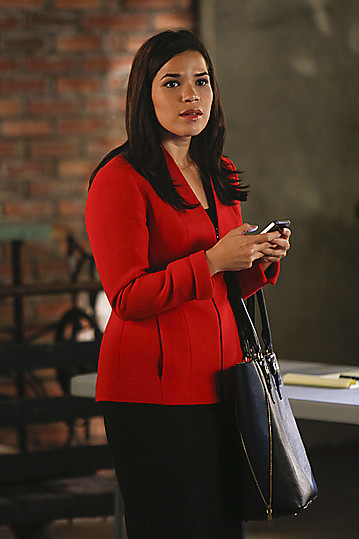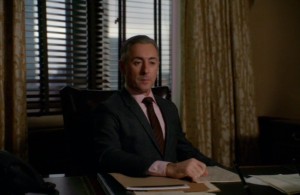The Good Wife, Episode 8: Eli Gold and Henri Bergson
Natalie Flores, Lockhart Gardner’s former intern and Eli’s former love interest, returns to ask for legal help in a deportation case her lobbying firm is monitoring. Since I thought the Eli-Natalie romance was season two’s most boring subplot, I wasn’t all that thrilled at the prospect of its return. Happily, this episode assuaged my apprehensions. Eli, like many of The Good Wife’s second and third-tier characters, has always cut a comic figure. “The Next Month” throws the sources of that comedy into high relief.
Henri Bergson wrote that comedy derives from the impression of “something mechanical encrusted upon the living.” By “mechanical,” Bergson referred not just to a machine-like quality, but to any rigidity, whether physical, mental, or social. The professor who inveigles her pet theory into every conversation? Funny. The “I’ve fallen and I can’t get up” commercials of my 1980s childhood? Unintentionally hilarious. (Both bad actors and the elderly are cursed with insufficient plasticity). Charlie Chaplin in Modern Times? Amazing.
The mechanical has so encrusted itself on Eli it’s a wonder he hasn’t grown an exoskeleton. He is a control-freak’s control freak. His need to manipulate people and events give his actions a rigidity underscored by the overwound physicality Alan Cumming brings to the character. But at Bergson suggests, such single-mindedness actually leads to a loss of control, an difficulty navigating around obstacles, a tendency to break rather than bend. Eli’s most comedic moments typically occur when he encounters someone or something he can’t manipulate, like Becca, season one’s teenage power tweeter, or Jackie, whose own obdurate personality provides the perfect foil for Eli’s. (Eli and Jackie’s first-episode confrontation takes place in Jackie’s exercise class—an activity designed to increase flexibility.)
In this episode, the obstacle Eli can’t control is his undiminished attraction to Natalie.
Insert Laura’s obligatory “Natalie is Ugly Betty??” moment.
Arms akimbo, his normally gel-immobilized hair flapping, Eli runs after as Natalie leaves the Florrick Agos offices, only to literally bump into her. In a later scene, when told that she has come to visit him at his own office, he embarks on a frantic attempt to set the stage, clearing his desk, attempting to assume a “relaxed’ pose only to pitch over backwards in his chair, and then forcing his face into an expression that he imagines radiates appropriate professionalism, but actually just makes him look constipated.
The pratfalls that the writers put Eli through are standard-issue rom-com material. They work because his displays of physical inflexibility reveal something crucial about his character, and about comedy. Eli appears mechanical in a Bergsonian sense because, as a limited, emotional human being, he can never achieve the perfect flexibility of total control. Were he ever to do so, he would cease to be funny. Paradoxically, the mechanical remains humorous because it has not succeeded in swallowing up the living.









